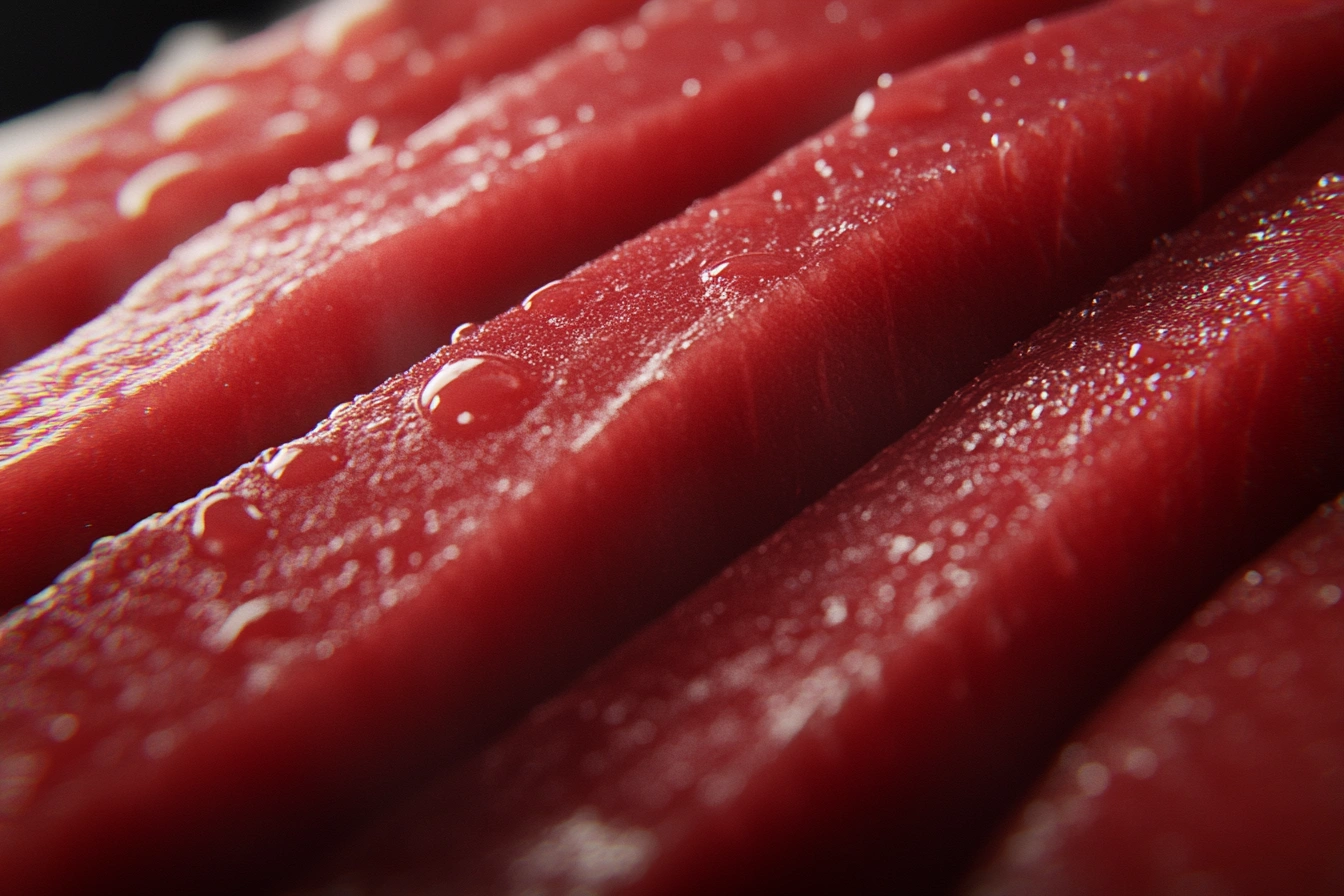Understanding Beef Tendon and Halal Guidelines
1. Introduction
Beef tendon is a unique and highly valued ingredient in many global cuisines, particularly in Asian, Middle Eastern, and European dishes. It is prized for its gelatinous texture when slow-cooked, making it a popular addition to soups, stews, and braised dishes. Rich in collagen and protein, beef tendon is also sought after for its health benefits, particularly for joint health and skin elasticity.
For Muslims following halal dietary laws, the question arises: Is beef tendon halal? The permissibility of beef tendon depends on how the animal was slaughtered and whether it adheres to Islamic guidelines for halal meat.
In this section, we will explore:
- What beef tendon is and its common uses.
- Halal dietary laws and what makes meat halal.
- Factors that determine whether beef tendon is halal or haram.
By understanding these aspects, Muslims can make informed choices about consuming beef tendon while ensuring their diet aligns with Islamic principles.
Table of Contents
2. What Is Beef Tendon?
📌 Definition and Structure
Beef tendon is a connective tissue found in cows, specifically in the legs, shoulders, and other areas requiring strong support. Tendons connect muscles to bones, making them naturally tough and fibrous.
📌 Appearance and Texture
✅ Raw Beef Tendon:
- Pale, off-white, or yellowish in color.
- Extremely tough and firm with a rubbery texture.
- Requires long cooking times to become tender.
✅ Cooked Beef Tendon:
- Turns soft, gelatinous, and slightly chewy.
- Absorbs flavors well, making it ideal for braised dishes.
- Rich in collagen, which contributes to skin, hair, and joint health.
📌 Common Uses in Global Cuisines
🍜 Chinese Cuisine: Often found in braised dishes with soy sauce, star anise, and spices.
🍲 Japanese Cuisine: Used in gyusuji nikomi (beef tendon stew) and as a topping in ramen.
🥢 Vietnamese Cuisine: A key ingredient in pho, adding richness to the broth.
🥩 Western Cuisine: Sometimes used in bone broth, slow-cooked dishes, and collagen-rich stocks.
Due to its rich nutritional profile and versatile texture, beef tendon is an important ingredient in many traditional recipes. However, for Muslims, the halal status of beef tendon depends on how it is sourced.
3. What Makes Meat Halal?
For beef tendon to be considered halal, it must come from an animal that has been slaughtered according to Islamic dietary laws. Here’s a breakdown of what determines whether meat is halal or haram.
📌 Definition of Halal in Islam
In Islam, halal (حلال) means “permissible” or “lawful” under Sharia (Islamic law). When it comes to food, halal guidelines ensure that meat is ethically sourced, clean, and prepared in a specific manner.
📌 Key Conditions for Meat to Be Halal
For meat to be halal, the following Islamic slaughtering requirements (Zabiha method) must be met:
✅ The animal must be slaughtered by a Muslim who is of sound mind and understands halal laws.
✅ The name of Allah (Bismillah, Allahu Akbar) must be pronounced at the time of slaughter.
✅ The animal must be alive and healthy before slaughter.
✅ The slaughter must be done with a sharp knife to ensure a quick, humane, and complete cut to the jugular vein, carotid artery, and windpipe.
✅ The blood must be fully drained from the body since consuming blood is haram.
✅ The meat must not come into contact with haram substances, such as pork or alcohol.
📌 Haram Factors That Make Meat Impermissible
🚫 Improper Slaughter – If the animal is not slaughtered in accordance with Islamic guidelines, the meat is considered haram (forbidden).
🚫 Contamination with Non-Halal Substances – If beef tendon is processed in facilities that also handle pork or other non-halal meats, it may become impure (najis).
🚫 Consumption of Dead Animals (Carrion) – Any animal that dies naturally or is killed in a way that does not follow halal guidelines is haram.
🚫 Use of Stunning or Non-Halal Processing Methods – Some commercial meat processing plants use stunning or electrocution methods that may render the meat non-halal if not done correctly.
Final Thoughts on Halal Meat Guidelines
If beef tendon comes from a halal-certified source, it is permissible for Muslims to eat. However, if the beef is not slaughtered according to Islamic guidelines, it is considered haram.
To ensure halal compliance, Muslims should:
✔ Buy beef tendon from halal-certified butchers or suppliers.
✔ Look for halal certification logos on packaged meat products.
✔ Avoid beef tendon from unknown sources or non-halal restaurants.
In the next section, we will explore how to identify halal beef tendon, halal-certified alternatives, and frequently asked questions about beef tendon in a halal diet.

Is Beef Tendon Halal? Sourcing, Preparation, and Alternatives
4. Is Beef Tendon Halal?
The halal status of beef tendon depends entirely on how the cow was slaughtered and processed. Since beef itself is halal, beef tendon is permissible for Muslims to eat as long as it comes from an Islamically slaughtered animal.
📌 When Is Beef Tendon Halal?
✅ The cow was slaughtered according to Islamic guidelines (Zabiha method).
✅ The slaughtering process included reciting the name of Allah (Bismillah, Allahu Akbar).
✅ The meat was not cross-contaminated with haram substances such as pork or alcohol.
✅ The blood was fully drained, as consuming blood is haram in Islam.
📌 When Is Beef Tendon Haram?
🚫 The cow was not slaughtered according to Islamic law.
🚫 The tendon was processed in a facility that handles haram ingredients.
🚫 The product does not have halal certification and cannot be verified.
For Muslims, it is essential to verify the source of beef tendon before consumption, ensuring that it follows halal standards.
5. How to Identify Halal Beef Tendon
To avoid consuming non-halal beef tendon, follow these steps:
📌 Check for Halal Certification
Look for halal certification from trusted Islamic organizations on meat packaging. Some reliable halal certifiers include:
✔ JAKIM (Malaysia) – One of the most recognized halal authorities globally.
✔ IFANCA (USA) – Certifies halal products in North America.
✔ Halal Food Council International – Ensures compliance with Islamic dietary laws.

📌 Ask Your Butcher or Supplier
When buying beef tendon from local butchers or markets, ask the following:
✅ Was the cow slaughtered using halal methods?
✅ Does this meat come from a halal-certified supplier?
✅ Was the tendon processed separately from non-halal meat?
📌 Be Cautious of These Non-Halal Sources
🚫 Supermarket Pre-Packaged Beef Tendon – May not be halal unless labeled.
🚫 Restaurant Dishes – Many Asian and Western restaurants do not use halal-certified beef tendon.
🚫 Canned or Processed Beef Products – Often contain gelatin or other non-halal additives.
For peace of mind, Muslims should always double-check packaging labels, ask for halal certification, and buy from reputable halal butchers.
6. Halal Alternatives to Beef Tendon
For Muslims who cannot find halal-certified beef tendon, there are several alternatives that offer similar texture and nutritional benefits.
📌 Fish-Based Collagen Sources
🐟 Fish gelatin and collagen-rich fish cuts provide a similar gelatinous texture when slow-cooked. Since fish is always halal, this is a safe and accessible alternative.
📌 Plant-Based Alternatives
🌱 Agar-Agar: A seaweed-based thickener often used in soups and desserts to replace gelatin.
🌱 Pectin: A fruit-derived gelling agent commonly used in jams and jellies.
🌱 Carrageenan: Another seaweed-based thickener found in dairy products and plant-based broths.
📌 Kosher Beef Tendon: Is It Halal?
There is a debate among scholars regarding kosher meat. Some Muslims accept kosher beef as halal, while others argue that it does not meet full Islamic requirements. If unsure, it is best to avoid kosher meat unless explicitly certified halal.
If halal beef tendon is unavailable, fish-based and plant-based options provide a suitable alternative for Muslims following a strict halal diet.
7. Frequently Asked Questions
📌 Is all beef tendon halal?
No. Beef tendon is halal only if the cow was slaughtered according to Islamic guidelines. If the slaughter method is unknown, it is best to verify its halal status before consumption.
📌 Can Muslims eat beef tendon from non-halal restaurants?
It depends. If the restaurant uses halal-certified beef, then it is permissible. However, most non-halal restaurants use conventional beef, which may not meet Islamic dietary laws.
📌 Does beef tendon contain gelatin?
Yes, beef tendon is naturally rich in collagen, which turns into gelatin when cooked. However, it is not the same as processed gelatin, which often comes from pork or non-halal sources.
📌 Is kosher beef tendon halal?
Some scholars say kosher meat is close to halal, while others disagree because Jewish slaughtering practices differ from Islamic methods. To be safe, Muslims should choose explicitly halal-certified beef.
📌 Where can I buy halal-certified beef tendon?
Halal beef tendon can be found at:
✔ Halal butcher shops
✔ Specialty halal grocery stores
✔ Online halal meat suppliers
8. Conclusion
Beef tendon is a delicious, nutritious ingredient that is widely used in Asian and Western cuisines. However, for Muslims, its halal status depends on how the cow was slaughtered and whether the tendon was processed without contamination from haram substances.
To ensure halal compliance, Muslims should:
✔ Buy from halal-certified butchers or suppliers.
✔ Look for halal certification labels from trusted organizations.
✔ Avoid beef tendon from unknown or non-halal sources.
If halal-certified beef tendon is unavailable, Muslims can consider fish-based collagen sources or plant-based alternatives like agar-agar and pectin.
By making informed choices, Muslims can enjoy nutritious, halal-friendly meals while adhering to Islamic dietary laws.

